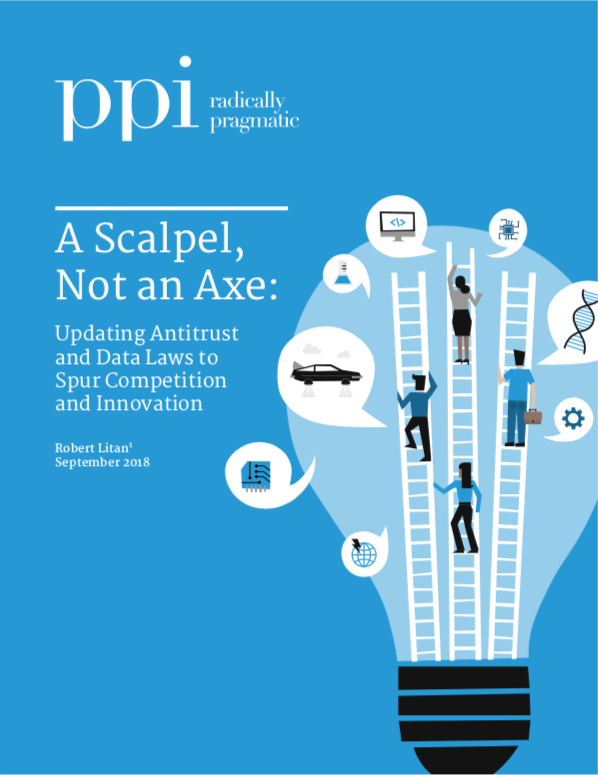WASHINGTON—As the Federal Trade Commission (FTC) kicks off public hearings today on economic concentration and competition, the Progressive Policy Institute (PPI) weighs in with a new e-book by economist and antitrust lawyer, Robert Litan, one of America’s leading authorities on antitrust law and competition policy.
In A Scalpel, Not an Axe: Updating Antitrust and Data Laws to Spur Competition and Innovation, Litan takes a deep dive into the growing debate here and abroad about the market power of big U.S. companies, especially in the tech sector. The emergence of “tech-lash,” he says, highlights some valid public concerns, but none rise to the level of justifying the drastic solutions peddled by “antitrust populists:” breaking up the big tech firms or regulating them as public utilities.
 Instead, Litan offers a measured policy response to economic concentration. “While there is a temptation to turn to radical solutions to fix our problems – with growing income inequality and our newfound worries about a loss of privacy – major departures from existing policies, especially toward some of the most successful private sector firms and the major economic and social benefits they have generated, also risk unintended costly consequences with uncertain benefits,” he writes.
Instead, Litan offers a measured policy response to economic concentration. “While there is a temptation to turn to radical solutions to fix our problems – with growing income inequality and our newfound worries about a loss of privacy – major departures from existing policies, especially toward some of the most successful private sector firms and the major economic and social benefits they have generated, also risk unintended costly consequences with uncertain benefits,” he writes.
“Bob Litan’s timely new ebook establishes a new benchmark for rigorous and systematic thinking about the impact of America’s dominant tech platforms on competition and inequality,” said PPI President Will Marshall. ” It illuminates the real problems progressives should tackle and offers pragmatic remedies that won’t jeopardize America’s crucial lead in high-tech innovation.”
Among his key findings, Litan concludes that while tech platforms on balance have not harmed economy-wide innovation, there is evidence that the strength of competition throughout the economy has lessened somewhat. There is also evidence that the rise of the tech platforms and concentrated employer markets across multiple sectors at the local level are contributing to wage inequality.
Anti-trust policy, however, isn’t the right lever for dealing with these concerns, Litan maintains. Other targeted policies, outside antitrust, would improve the state of competition in America, including lifting unnecessary occupational licensing requirements, an end to “no poaching” agreements, and a return to freer trade, which disciplines pricing by U.S. companies.
“There is yet no sound legal or policy basis for to break technology platform firms up for antitrust or other reasons. The law justifiably requires severe and/or sustained anticompetitive conduct as a precondition for court-ordered breakups,” he writes.
Noting the trend toward mergers between firms with dominant positions in different markets, the book proposes tightening the statutory test for mergers and establishing a rebuttable presumption against mergers where the acquiring firm has a dominant position in its market and has the ability to effectively enter any market in which the acquired firm competes.
Nonetheless, the growth of these firms has generated significant non-antitrust concerns about data security and privacy. Litan recommends updating data laws to protect privacy and security by requiring all firms, not just those in tech, to provide plain English explanations of what data the firms collect about consumers and how it is used, the ability to opt out of having their information shared with third parties, and the full disclosure of funding for political ads. He argues that federal law should also require all large data warehouses – a term that would require further definition in an authorized rulemaking – to adopt reasonable measures to ensure data security.
A Scalpel, Not an Axe also warns that the strongest regulations tech’s critics demand may also pose a threat to competition. “In all that they do to regulate the tech industry more intensely, policymakers must be aware that additional data-related regulation is likely to favor large incumbent tech firms relative to smaller competitors and new entrants. Regulatory compliance is a fixed cost, and larger firms can take advantage of their economies of scale to comply,” Litan writes.
# # #